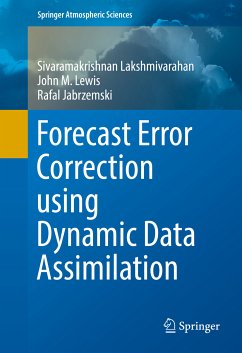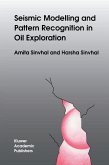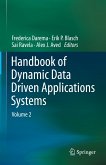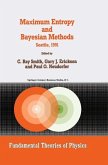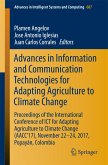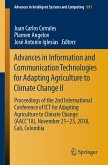Sivaramakrishnan Lakshmivarahan, John M. Lewis, Rafal Jabrzemski
Forecast Error Correction using Dynamic Data Assimilation (eBook, PDF)
68,95 €
68,95 €
inkl. MwSt.
Sofort per Download lieferbar

34 °P sammeln
68,95 €
Als Download kaufen

68,95 €
inkl. MwSt.
Sofort per Download lieferbar

34 °P sammeln
Jetzt verschenken
Alle Infos zum eBook verschenken
68,95 €
inkl. MwSt.
Sofort per Download lieferbar
Alle Infos zum eBook verschenken

34 °P sammeln
Sivaramakrishnan Lakshmivarahan, John M. Lewis, Rafal Jabrzemski
Forecast Error Correction using Dynamic Data Assimilation (eBook, PDF)
- Format: PDF
- Merkliste
- Auf die Merkliste
- Bewerten Bewerten
- Teilen
- Produkt teilen
- Produkterinnerung
- Produkterinnerung

Bitte loggen Sie sich zunächst in Ihr Kundenkonto ein oder registrieren Sie sich bei
bücher.de, um das eBook-Abo tolino select nutzen zu können.
Hier können Sie sich einloggen
Hier können Sie sich einloggen
Sie sind bereits eingeloggt. Klicken Sie auf 2. tolino select Abo, um fortzufahren.

Bitte loggen Sie sich zunächst in Ihr Kundenkonto ein oder registrieren Sie sich bei bücher.de, um das eBook-Abo tolino select nutzen zu können.
- Geräte: PC
- ohne Kopierschutz
- eBook Hilfe
- Größe: 7.49MB
Andere Kunden interessierten sich auch für
![Systems Engineering (eBook, PDF) Systems Engineering (eBook, PDF)]() Adedeji B. BadiruSystems Engineering (eBook, PDF)73,95 €
Adedeji B. BadiruSystems Engineering (eBook, PDF)73,95 €![Seismic Modelling and Pattern Recognition in Oil Exploration (eBook, PDF) Seismic Modelling and Pattern Recognition in Oil Exploration (eBook, PDF)]() A. SinvhalSeismic Modelling and Pattern Recognition in Oil Exploration (eBook, PDF)72,95 €
A. SinvhalSeismic Modelling and Pattern Recognition in Oil Exploration (eBook, PDF)72,95 €![Handbook of Dynamic Data Driven Applications Systems (eBook, PDF) Handbook of Dynamic Data Driven Applications Systems (eBook, PDF)]() Handbook of Dynamic Data Driven Applications Systems (eBook, PDF)136,95 €
Handbook of Dynamic Data Driven Applications Systems (eBook, PDF)136,95 €![Maximum Entropy and Bayesian Methods (eBook, PDF) Maximum Entropy and Bayesian Methods (eBook, PDF)]() Maximum Entropy and Bayesian Methods (eBook, PDF)160,95 €
Maximum Entropy and Bayesian Methods (eBook, PDF)160,95 €![Climate and Environmental Database Systems (eBook, PDF) Climate and Environmental Database Systems (eBook, PDF)]() Climate and Environmental Database Systems (eBook, PDF)112,95 €
Climate and Environmental Database Systems (eBook, PDF)112,95 €![Advances in Information and Communication Technologies for Adapting Agriculture to Climate Change (eBook, PDF) Advances in Information and Communication Technologies for Adapting Agriculture to Climate Change (eBook, PDF)]() Advances in Information and Communication Technologies for Adapting Agriculture to Climate Change (eBook, PDF)112,95 €
Advances in Information and Communication Technologies for Adapting Agriculture to Climate Change (eBook, PDF)112,95 €![Advances in Information and Communication Technologies for Adapting Agriculture to Climate Change II (eBook, PDF) Advances in Information and Communication Technologies for Adapting Agriculture to Climate Change II (eBook, PDF)]() Advances in Information and Communication Technologies for Adapting Agriculture to Climate Change II (eBook, PDF)72,95 €
Advances in Information and Communication Technologies for Adapting Agriculture to Climate Change II (eBook, PDF)72,95 €-
-
-
Produktdetails
- Verlag: Springer International Publishing
- Seitenzahl: 270
- Erscheinungstermin: 21. Oktober 2016
- Englisch
- ISBN-13: 9783319399973
- Artikelnr.: 46929356
Dieser Download kann aus rechtlichen Gründen nur mit Rechnungsadresse in A, B, BG, CY, CZ, D, DK, EW, E, FIN, F, GR, HR, H, IRL, I, LT, L, LR, M, NL, PL, P, R, S, SLO, SK ausgeliefert werden.
- Herstellerkennzeichnung Die Herstellerinformationen sind derzeit nicht verfügbar.
Dr. Sivaramakrishnan Lakshmivarahan (Varahan, for short) joined the University of Oklahoma in the fall of 1978 where he is currently a George Lynn Cross Research Professor at the School of Computer Science. From 1973-1978 he has held postdoctoral and faculty positions at Brown University, Yale University and Indian Institute of Technology, Madras, India. He obtained his PhD in 1973 from the Indian Institute of Science in Bangalore, India. He is the author/coauthor of 5 books and has published extensively in a number of areas including Learning Algorithms, Parallel Architecture and Algorithms, Dynamic Data Assimilation and Computational Finance. He has supervised 30 PhD dissertations and 42 MS Theses. He is Fellow of the IEEE and a Fellow of the ACM and has won numerous awards- Regents award for Superior Teaching and Regents Award for Research and Creative Activity. He has held short-term visiting appointments at leading academic centers in Japan, Taiwan, China, Germany, England, Canada, Mexico and USA. He has been inducted into the Oklahoma Higher Education Hall of Fame in 2014. John Lewis' scientific training is in geophysics and meteorology along with an interest and training in applied mathematics, especially mathematical physics with concentration in variational mechanics. Dr. Lewis was fortunate to be trained under George Platzman at University of Chicago and Yoshikazu Sasaki at University of Oklahoma and he has worked for private industry (Shell Oil Co., exploration seismology), operational weather prediction centers (U. S. government and U. S. Navy), academia (University of Illinois), and government science (as a director of research and as a research meteorologist). In the early 1990s, Dr. Lewis came under the influence of historian of science Duane Roller and began contributing to the history of science along with other work in meteorology. He has supervised doctoral dissertations of 10 students, contributed to over 150 research papers, and has published a book with another nearly completed on the history of science. Dr. Lewis was elected Fellow of the American Meteorological Society in 2007.
Dr. Rafal Jabrzemski has joined the Oklahoma Climatological Survey in 1999, where he works as a software engineer developing applications related to quality assurance of meteorological data from the Oklahoma Mesonet, and decision support applications that use meteorological data such as agrometeorological models and Oklahoma Fire Danger Model. In 2014, he defended his Ph. D. dissertation: "Application of the Forward Sensitivity Method to Data Assimilation of the Lagrangian Tracer Dynamics"
Dr. Rafal Jabrzemski has joined the Oklahoma Climatological Survey in 1999, where he works as a software engineer developing applications related to quality assurance of meteorological data from the Oklahoma Mesonet, and decision support applications that use meteorological data such as agrometeorological models and Oklahoma Fire Danger Model. In 2014, he defended his Ph. D. dissertation: "Application of the Forward Sensitivity Method to Data Assimilation of the Lagrangian Tracer Dynamics"
Part I Theory.- Introduction.- Dynamics of evolution of first- and second-order forward sensitivity: discrete time and continuous time.- Estimation of control errors using forward sensitivities: FSM with single and multiple observations.- Relation to adjoint sensitivity and impact of observation.- Estimation of model errors using Pontryagin's Maximum Principle- its relation to 4-D VAR and hence FSM.- FSM and predictability - Lyapunov index.- Part II Applications.- Mixed-layer model - the Gulf of Mexico problem.- Lagrangian data assimilation.- Conclusions.- Appendix.- Index.
Part I Theory.- Introduction.- Dynamics of evolution of first- and second-order forward sensitivity: discrete time and continuous time.- Estimation of control errors using forward sensitivities: FSM with single and multiple observations.- Relation to adjoint sensitivity and impact of observation.- Estimation of model errors using Pontryagin's Maximum Principle- its relation to 4-D VAR and hence FSM.- FSM and predictability - Lyapunov index.- Part II Applications.- Mixed-layer model - the Gulf of Mexico problem.- Lagrangian data assimilation.- Conclusions.- Appendix.- Index.
